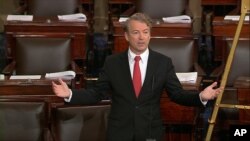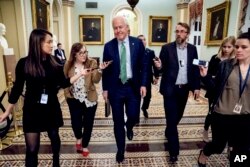A single Republican senator late Thursday held up a bipartisan bill to keep the U.S. government open hours before federal funds were set to expire, increasing the likelihood with every passing minute of the second partial federal shutdown in less than a month.
Rand Paul of Kentucky objected to the Senate proceeding to vote on a two-year budget deal that would boost military and domestic spending by hundreds of billions of dollars, saying it would explode America's already rising federal deficit and add to the nation's more than $20 trillion national debt.
"I can't, in all good honesty, in all good faith, just look the other way," Paul said in a fiery and lengthy floor speech that consumed dwindling time that Congress had to avert a halt of nonessential federal operations. "We have a 700-page bill that no one has read that was printed at midnight. … Nothing will be reformed, the waste will continue."
Paul's objection drew an angry response from a fellow Republican, Senator Lindsey Graham of South Carolina, who argued America's military desperately needs additional funds after years of budget caps that constrained both the Pentagon and domestic programs.
"Debt and deficits are no excuse to leave the war fighter hanging," Graham said. "Whatever it is to keep our military going, I'll do it."
Senate rules
Under Senate rules, any member can speak for as long as he or she desires, unless three-fifths of the body votes to end debate. Any senator also can object to a vote, causing lengthy procedural delays.
Paul's action threw into chaos a carefully choreographed script for how the day's legislative business was to be conducted, with swift Senate and House votes so that the budget deal could be sent to the White House for President Donald Trump's signature with time to spare before midnight in Washington, when federal spending authority ends absent an extension.
Senate procedures would allow a vote on the budget deal to go forward at 1 a.m. Friday EST, with or without Paul's consent. But the government shutdown would have begun by that time.
"We can provide certainty to the thousands and thousands of people who expect government to be open, or we can play this game [with a vote delay] until 1 a.m.," Republican Senator Thom Tillis of North Carolina said. "I, for one, think we should do it right now."
Hours before the Thursday night deadline, Representative Steny Hoyer, the No. 2 Democrat in the House, released a statement urging Republican leaders "to bring to the floor a one-day funding bill to keep the government open. Given that the Senate still has not passed" its agreement.
Bipartisan support
Negotiated between the Senate's Republican and Democratic leaders, the two-year budget bill appeared to have ample bipartisan support for passage in both houses of Congress.
"This agreement ensures that our armed forces will finally have the resources they need," Republican Senator John Cornyn of Texas said. "In addition, the funding bill will provide support for our veterans, those who have worn the uniform as well as their families, and it will clear the way for new investment in our nation's infrastructure."
"It's a good deal," Senate Democratic leader Chuck Schumer of New York said. "And it's a strong signal that we can break the gridlock that has overwhelmed this body and work together for the good of the country."
White House deputy press secretary Raj Shah told reporters at the daily briefing that, "We do support the two-year spending bill. It lifts the caps on defense spending, which is something the secretary of defense and the president's generals have told him they need to ensure that we rebuild our military and protect our national security."
The accord drew opposition from opposite extremes of Congress' ideological spectrum, but not in sufficient numbers to threaten passage. Some conservative Republicans blasted the added spending as a surrender to fiscal insanity.
Some progressive Democrats, meanwhile, protested the agreement's omission of any measure to end the threat of deportation for hundreds of thousands of young undocumented immigrants brought to America as children.
"They live and work here. They share our nation with us. Right now, we are being called upon to protect them from deportation and we must answer that call," Democratic Representative Luis Gutierrez of Illinois said. "Vote against this budget."
Partial shutdown in January
Democrats blocked a stopgap spending bill in January, triggering a three-day partial federal government shutdown, in part to protest Congress' inaction on Deferred Action for Childhood Arrivals (DACA), an Obama administration program that Trump rescinded last year and is set to expire March 5.
Bipartisan negotiations have yet to reach a deal on an overhaul of America's immigration laws. However, Senate Majority Leader Mitch McConnell has repeatedly promised to start Senate floor debate on immigration reform, including a fix for DACA recipients, after spending issues are resolved.
House Speaker Paul Ryan gave a similar assurance on Thursday, saying, "To anyone who doubts my commitment to solve this problem and bring up a DACA and immigration reform bill, do not. We will bring a solution to the floor, one that the president will sign."







